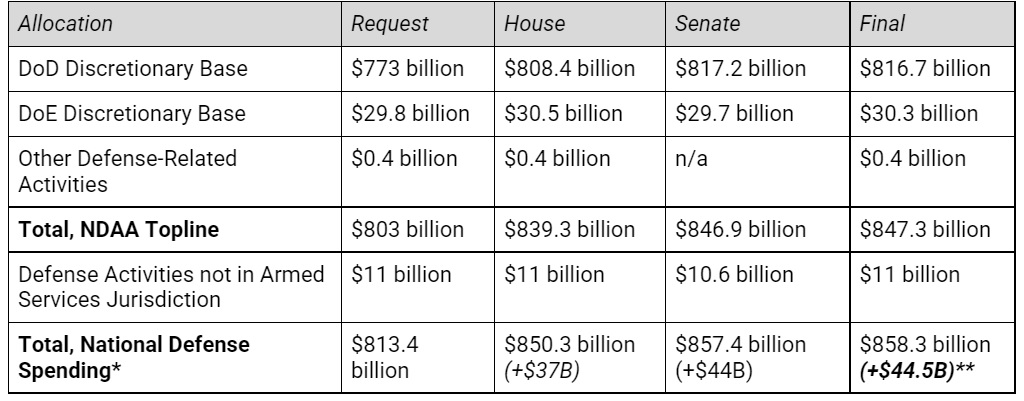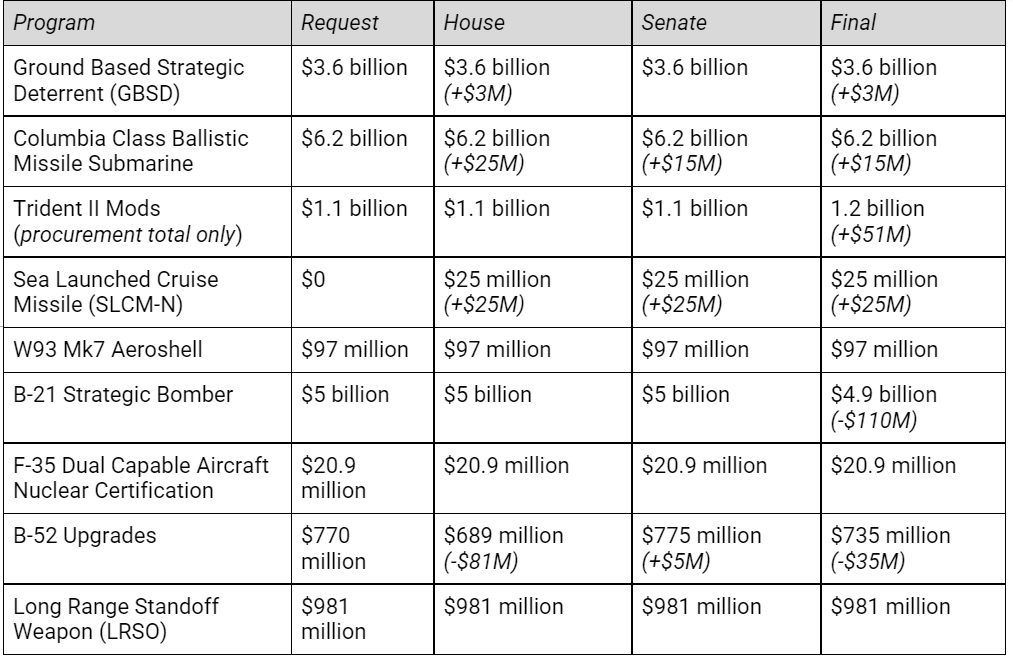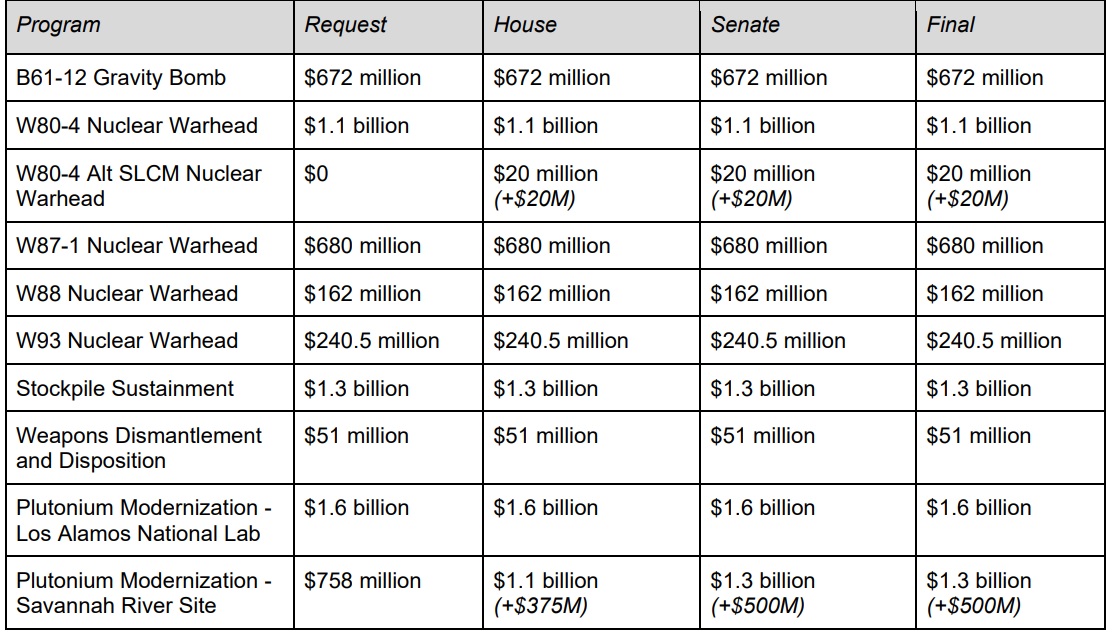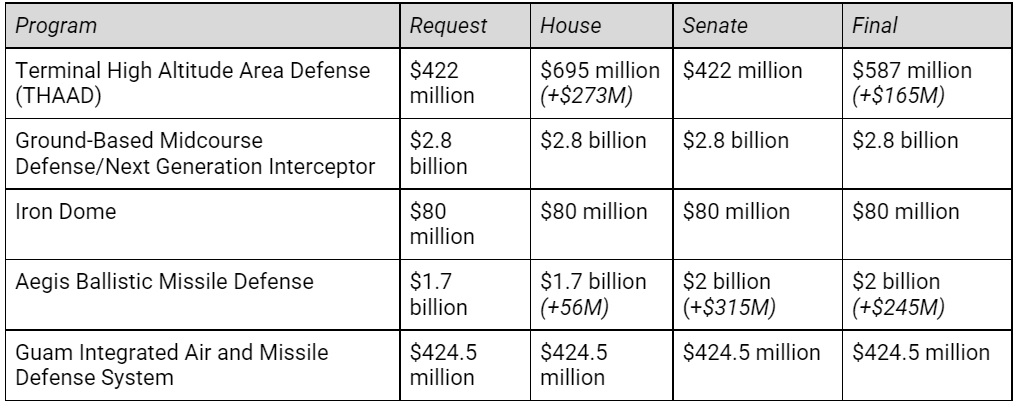- Table numbers in parentheses are increases or decreases from the FY23 Request
- FY23 requested levels come from the Center for Arms Control and Non-Proliferation’s Fiscal Year 2023 Defense Budget Request Briefing Book
- Numbers may not add due to rounding
Total National Defense Discretionary Spending Authorization (050)
*Does not include mandatory spending or any emergency spending, including for Ukraine
**Total increase from FY22 NDAA topline is $80.4 billion, or 10.3%
DOD Nuclear Weapons Funding Authorization for Select Programs
National Nuclear Security Administration (NNSA) Funding Authorization
DOE Nuclear Weapons Funding Authorization for Select Programs
Select Provisions Related to Nuclear Weapons
Nuclear Weapons Briefing
House: No similar provision
Senate: Requires a biannual briefing on nuclear matters from various DOD and NNSA officials (Sec. 1513)
Final: Adopts Senate provision (Sec. 1631)
Nuclear Weapons Council
House: Establishes a role for the Nuclear Weapons Council in coordinating risk management efforts between the DoD and NNSA (Sec. 1631)
Senate: Requires the Nuclear Weapons Council (NWC) to notify Congress within 30 days of a DOE budget request whether the request is adequate and requires notification if an authorization or appropriations bill enacted by Congress delays delivery or certification of a nuclear weapons system currently in development (Sec. 1511)
Final: Adopts House provision with amendments to realign certain statutory requirements concerning annual nuclear weapons budget assessments to fall within the list of enumerated NWC responsibilities (Sec. 1633)
Portfolio Management Framework for Nuclear Forces
House: Requires the SecDef to implement a portfolio management framework for nuclear forces to support greater oversight into risk management and prioritization activities across the nuclear weapons portfolio (Sec. 1632)
Senate: Requires the establishment of a joint risk management framework to periodically identify, analyze, and respond to risks that affect the nuclear enterprise of the United States (Sec. 1512)
Final: Adopts House provision but includes elements of Senate provision about reporting requirements and includes a termination of the reporting requirement 90 days after the SecDef certifies that the Sentinel ICBM, the Columbia SSBN, the LRSO, the B-21 bomber program, and the F-35A DCA have reached full operational capability (Sec. 1634)
Deployed ICBMs
House: Bars reducing the number of deployed intercontinental ballistic missiles below 400 (Sec. 1636)
Senate: Bars reducing the number of deployed intercontinental ballistic missiles below 400 (Sec. 1519)
Final: Bars reducing the number of deployed intercontinental ballistic missiles below 400 (Sec. 1639)
SLCM-N Reports
House: Requires several reports on the nuclear sea-launched cruise missile (SLCM-N) and prevents DoD or NNSA from proceeding with procurement of SLCM-N or its warhead until the required reports, an unclassified Nuclear Posture Review, and unclassified summary of the Analysis of Alternatives for the SLCM-N have been submitted to Congress and the SecDef certifies that SLCM-N is required to meet a valid military requirement and would not create risk to conventional or nuclear deterrence (Sec. 1634) and also limits DoD staff travel funds until all communication regarding the proposed budget limitation of the SLCM-N is released (Sec. 1635)
Senate: Limits funds authorized for the Under Secretary of Defense for Policy to 75% until the analysis of alternatives for the SLCM-N is released and briefed on to Congress (Sec. 1522)
Final: Adopts House provision Sec. 1634 with an amendment that requires an operational concept for SLCM-N, operational implications of SLCM-N deployment, and associated spending plans and prohibits FY23 funding to be used for system development and demonstration of the SLCM-N or for development engineering for the W80-4 ALT SLCM nuclear warhead until the required reports are submitted (Sec. 1642)
Hard & Deeply Buried Targets and B83 Retirement
House: Requires a study and briefing on nuclear and nonnuclear options to hold at risk hard and deeply buried targets (Sec. 1662)
Senate: Prohibits retiring the B83-1 until a report on the defeat of hard and deeply buried targets is provided to Congress (Sec. 1520)
Final: Adopts Senate provision but limits deactivation, dismantlement, or retirement of more than 25 percent of B83-1 gravity bombs in the active stockpile until 90 days after the report is submitted (Sec. 1674)
NNSA Weapons Authorization
House: Modifies the requirements for NNSA to no longer require a line item authorization from Congress prior to conducting Phase 1 (Sec. 3120)
Senate: Modifies the required budget request format for certain activities for new or modified nuclear weapons. (Sec. 3126)
Final: Adopts Senate provision with additional reporting requirements on development of nuclear weapons not requiring a specific line-item budget request (Sec. 3111)
W76-2 Retirement or Reconversion
House: Bars FY23 NNSA funds to be used to retire or reconvert W76-2 warheads without certification that Russia & China do not have equivalent capabilities (Sec. 3117)
Senate: No similar provision
Final: Adopts House provision (Sec. 3120)
Plutonium Pit Production
House: Acknowledges that the current statutory requirement for NNSA to produce 80 plutonium pits per year by 2030 is unachievable and implements a framework between DoD and NNSA to establish pit production requirements and realistic plans to meet those requirements and requires a NNSA briefing on options for partnering with private industry to mitigate supply chain risks related to the production and integration of pit plutonium production glove boxes(Sec. 3111)
Senate: Limits funds for the Under Secretary of Defense for Acquisition and Sustainment to no more than 75% until the Chairman of the Nuclear Weapons Council submits a plan to Congress to enable the nuclear security enterprise to meet pit production requirements (Sec. 1524) and strikes existing reporting and briefing requirements related to plutonium pit production and extends the annual certification that the NNSA’s plan is on track to meet 80 pits per year by 2030 (Secs. 1528-1529)
Final: Rejects House and Senate provisions but directs the Nuclear Weapons Council and NNSA to conduct a review of plutonium pit production and submit a plan to Congress by March 31, 2023 that includes high-confidence assessments of projected dates for the achievement of a production capacity of no fewer than 80 war reserve plutonium pits per year (JES pg. 431-433)
Risk of Nuclear Use in Ukraine
House: Requires a DoD a risk assessment regarding likelihood of use of a nuclear weapon as a result of Russia’s invasion of Ukraine and whether such risk increases as the war continues (Sec. 1242)
Senate: No similar provision
Final: Rejects House provision but requires a briefing from the DIA Director on Russian nuclear activities related to its war against Ukraine, including an accounting of Russian nuclear activities and signaling during the conflict, any temporary or permanent adjustments to Russian strategic and theater nuclear posture that have occurred, and an updated assessment of Russian nuclear doctrine and thresholds for nuclear employment based on its conduct during its war against Ukraine (JES pg. 318)
ICBM Reports
House: No similar provision
Senate: Limits funds authorized for the Under Secretary of Defense for Policy to 50% until any 2021 or 2022 reports contracted by the federal government regarding a Minuteman III service life extension or the future of the ICBM force are submitted to Congress (Sec. 1518)
Final: Rejects Senate provision
US-UK Nuclear Cooperation
House: No similar provision
Senate: Expresses the sense of the Senate about the value of the U.S., U.K. and French nuclear deterrents for NATO and that continued nuclear cooperation will help both the U.S. and U.K. modernize more effectively (Sec. 1517)
Final: Rejects Senate provision
Low-Enriched Uranium (LEU) R&D
House: Authorizes $20 million for R&D of advanced naval nuclear fuel systems based on LEU (Sec. 1624)
Senate: Limits the use of funds for LEU naval fuel systems until a report on the validity of such a system and whether it would decrease vehicle capacity or increase cost is provided to Congress (Sec. 1521)
Final: Rejects both the House and Senate provisions, but authorizes $20M for LEU nuclear fuels R&D
Nuclear Warhead Acquisition Oversight
House: Expands reporting and certification requirements to include any new or modified nuclear warhead for which NNSA may be authorized to pursue (Sec. 3112)
Senate: No similar provision
Final: Rejects House provision
CTBTO Funding
House: Repeals the restriction on funding for the Preparatory Commission for the Comprehensive Nuclear-Test-Ban Treaty Organization (Sec. 1345)
Senate: No similar provision
Final: Rejects House provision
Nuclear Forensics
House: Codifies NNSA as the interagency lead on nuclear forensics and makes NNSA responsible for integrating the National Technical Nuclear Forensics activities in a consistent, unified strategic direction (Sec. 3122)
Senate: No similar provision
Final: Rejects House provision
Missile Defeat and Defense Funding Authorization for Select Programs
Select Provisions Related to Missile Defense
Biannual Missile Defense Briefing
House: No similar provision
Senate: Requires biannual missile defense briefings each year by certain DOD, MDA, and Joint Staff officials (Sec. 1545)
Final: Adopts Senate provision (Sec. 1651)
BMD Systems Acquisition Authority
House: Repeals requirement to transition acquisition authority of ballistic missile defense programs from MDA to military departments (Sec. 1641)
Senate: No similar provision
Final: Adopts House provision making the repeal contingent upon a report required by the FY22 NDAA regarding the independent study of DoD component roles and requirements related to missile defense (Sec. 1655)
BMD Cyber Operations
House: No similar provision
Senate: Directs the Director of the Missile Defense Agency to develop a plan to conduct persistent cybersecurity operations across all networks and systems supporting the Ballistic Missile Defense System (Sec 1541)
Final: Adopts Senate provision with an additional requirement that the plan be coordinated with CYBERCOM and other combatant commands and Joint Chiefs functions as appropriate (Sec. 1656)
Middle East Integrated Air and Missile Defense
House: Authorizes the SecDef to seek to collaborate with U.S. allies and partners of the United States in the Middle East to implement an integrated air and missile defense architecture and requires a strategy and reporting on increasing such cooperation (Sec. 1645)
Senate: Requires the Secretary of Defense to undertake a strategy for improved integrated air and missile defense cooperation between the United States and certain Middle Eastern allies and partners to counter threats from Iran and Iranian-linked groups and requires a cost feasibility study to achieve such progress (Sec. 1542)
Final: Adopts House provision with clarifying amendments (Sec. 1658)
Israeli Missile Defense Program Co-Development and Co-Production
House: No similar provision
Senate: Authorizes up to $80 million for the Iron Dome short-range rocket defense system, $40 million for the David’s Sling Weapon System, and $80 million for the Arrow 3 Upper Tier Interceptor Program (Sec. 1547)
Final: Adopts Senate provision (Sec. 1659)
Integrated Air and Missile Defense Architecture for Defense of Guam
House: Requires a report on the missile defense sensor architecture of U.S. Indo-Pacific Command and an independent assessment of the integrated air and missile defense architecture to defend Guam (Sec. 1647)
Senate: Requires the Secretary of Defense to designate a senior Department of Defense official to be responsible for Guam missile defense (Sec. 1543)
Final: Combines House and Senate provisions (Sec. 1660)
Hypersonic Missile Defense
House: Requires a strategy from DoD on how to implement asymmetric capabilities to defeat hypersonic missile threats (Sec. 1646)
Senate: No similar provision
Final: Adopts House provision (Sec. 1662)
NGI Funding Plan
House: No similar provision
Senate: Requires the Secretary of Defense to submit a plan on the acquisition of no fewer than 64 Next Generation Interceptors (NGI) with the 2024 budget request and requires a report at least 90 days before any decision to cancel the NGI program (Sec. 1544)
Final: Adopts Senate provision and a request for a funding profile for the acquisition cost of no fewer than 64 interceptors (Sec.1654)
Miscellaneous Programs & Provisions of Interest
Pay Raise
House: Authorizes a 4.6% pay raise for service members and civilians
Senate: Authorizes a 4.6% pay raise for service members and civilians
Final: Authorizes a 4.6% pay raise for service members and civilians
CTR Funds
House: Authorizes $342 million, the requested level, for the Defense Cooperative Threat Reduction Program (Sec. 1661)
Senate: Authorizes $342 million, the requested level, for the Defense Cooperative Threat Reduction Program (Sec. 1301)
Final: Adopts House provision with an amendment to increase the overall amount to $354.4 million adjusted for inflation (Sec. 1671)
1991 AUMF
House: Repeals the 1991 Authorization for the Use of Military Force against Iraq (Sec. 5878)
Senate: No similar provision
Final: Rejects House provision
2002 AUMF
House: Repeals the 2002 Authorization for the Use of Military Force against Iraq (Sec. 1229A)
Senate: No similar provision
Final: Rejects House provision
Iran Nuclear Program
House: Expresses a sense of Congress reiterating its commitment to ensuring Iran will never acquire a nuclear weapon and condemning Iran for its lack of cooperation with the IAEA on the unresolved matter of uranium particles discovered at undeclared sites (Sec. 5846)
Senate: No similar provision
Final: Adopts House provision (Sec. 5599G)
Divided Korean Families Reunification
House: Urges the Secretary of State to consult with South Korean officials on potential opportunities to reunite Korean Americans with family members in North Korea and encourages the Special Envoy on North Korean Human Rights Issues to work with the Korean American community on reunification matters (Sec. 5837)
Senate: No similar provision
Final: Adopts House provision (Sec. 5599B)
Sources
Text of Final Compromise Version of the Bill
Joint Explanatory Statement (JES)
HASC Summary of the Final Bill
SASC Summary of the Final Bill
Center for Arms Control and Non-Proliferation full summary of House-passed bill
Center for Arms Control and Non-Proliferation full summary of SASC-approved bill






